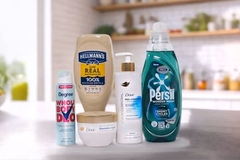Boosting natural cosmetics: Multi-functional seaweed applications can replace synthetic ingredients

13 Oct 2022 --- A study on seaweed highlights several uses for cosmetics, such as antifungal, antimicrobial, anti-inflammatory and antioxidant applications. The bioactive compounds are also touted to provide solutions to mitigate climate change, lower the use of synthetic ingredients and boost the industry’s move toward natural sources.
Due to their novel chemical structure and constituents, seaweeds can be used as natural cosmetics or incorporated into cosmetic formulas.
The researchers suggest using seaweed in anti-aging, anti-acne, deodorizing and moisturizing formulations. They also recommend using seaweed in whitening, anti-wrinkle, anti-inflammatory, sensory enhancing, anti-allergic and ultraviolet protective products. Moreover, it can act as a stabilizer and thickening agent.
“Purified metabolites derived from seaweeds could be used as natural components in synthetic cosmetics and medicines,” suggest the researchers.
Moreover, the study extensively offers solutions to bioenergy generation, agriculture, food consumption, animal and human health, functional chemicals, bioactive ingredients and coastal management. Additionally, it provides a “circular bioeconomy strategy” for environmental sustainability.
 Using seaweed could reduce reliance on chemical products and their resistance issues.Cosmetic applications
Using seaweed could reduce reliance on chemical products and their resistance issues.Cosmetic applications
According to the authors, natural-derived ingredients are less hazardous than synthetic ingredients and have greater bioactivities with minimal cytotoxicity effects in humans.
They say that seaweeds can be used in the cosmetics industry as bioactive constituents, texturing stabilizers or emulsifiers, organic dyes and materials of skincare-relevant biomolecules.
Fucus, Laminaria, and Chondrus seaweeds have been highlighted for their ability to nourish and rehydrate the skin. The seaweeds also possess anti-photoaging characteristics mediated by intracellular reactive oxygen species scavenging bioactivity.
Cellulite is noted to be a cosmetic problem and may be relieved by routine skincare to enhance the visual look of the skin.
“Laminaran polysaccharide obtained from Laminaria is mainly used as an anticellulite product due to laminaran’s wide range of bioactive assets. Fucoidan has the potential to be applied as an anti-aging agent because fucoidan can improve the elasticity and hydration of cells by promoting the synthesis of heparin-growth factor, which improves the growth of tissues and cells.”
Protection against sun-induced skin issues
The study spotlights seaweeds protect against sunburn, sun-induced pigmentation and tanned skin.
“The overexposure of human skin to solar radiation, pollutants and cosmeceutical ingredients derived from chemicals increases the production of reactive oxygen species, resulting in various skin problems,” informs the study published in Environmental Chemistry Letters. The study spotlights seaweeds protect against sunburn, sun-induced pigmentation and tanned skin.
The study spotlights seaweeds protect against sunburn, sun-induced pigmentation and tanned skin.
Previous research by the National Research Foundation of Korea found Sargassum spp. extract – a genus of macroalgae – could be used in the healthy aging space for its nutraceutical properties like prevention and improvement of skin aging while also offering anti-inflammatory properties.
Inflammatory responses induced by UV exposure, a causative factor in skin aging and skin cancer, were studied to reveal the anti-inflammatory effects of Sargassum spp. extract.
According to a review paper funded by Spain’s Ministry of Science, Innovation and Universities, seaweed also contains polyunsaturated fatty acids that can improve skin barrier protection and other biological processes. Researchers conclude that seaweed-infused nutricosmetics may have an anti-obesity effect and can control inflammatory reactions.
“Seaweed potentially has an important role to play in the nutricosmetic category,” Amanda Mackinnon, marketing and communications manager at Marinova, previously told PersonalCareInsights.
Edited by Radhika Sikaria













